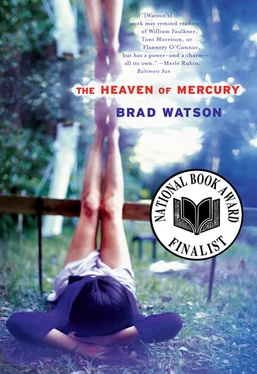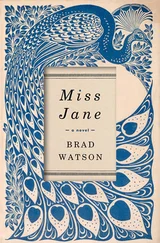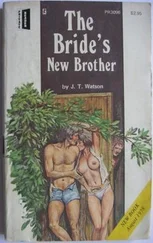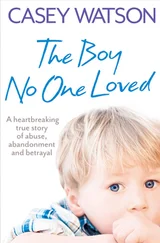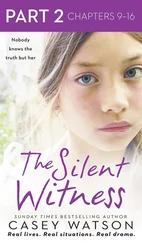He didn’t like the drinking, either. When Papa finally came home after two years he took it right up again. After all we did to get you out, Mama said. After all that, you haven’t changed. He would do it at home, then, sitting in the chair on the porch drinking straight from a bottle in his one pocket, the pistol back in the other like he’d never killed Uncle Thad with it. His friend the sheriff had given it back to him, said You might need it. He sold insurance then and made good money, never drank during the day, but at night. They never saw Aunt Phoebe anymore unless they went to Cuba in Alabama, where she’d gone to live with Uncle Thad’s and Mama’s family over there. Papa wouldn’t go along. When they came home he’d say something ugly. Uncle Thad and Mama were brother and sister. Sometimes I think that’s why he didn’t like Thad, Mama said. Like he thought one of them had to be the family big shot. Your papa don’t like nobody cutting his territory, business or pleasure or blood, none of it.
He, Earl, didn’t like the drinking but what can a boy say about something like that. He fought other boys. Papa praised him for it, in word or gaze. Once when he fought after school in second grade he knocked the boy’s front tooth out and brought it home and put it on his dresser. Mama wouldn’t go into his room, told him to throw it away. Papa told her to leave him alone, she couldn’t understand a boy’s ways. They fought. He never hit her. That’s why he argued with Uncle Thad, he told Earl. He hit Aunt Phoebe. Man hits a woman’s no better than a dog, a sick weak dog, he said. He’s a coward. Never be a coward, he said. Don’t ever let anybody get away with crossing you, they’ll never let you walk upright again.
Didn’t need the lesson, it was in his blood. What it didn’t do, like it did later with Levi and later with Papa, too, was turn to meanness. But just hot blood. Couldn’t help it. Almost lost his job with the New York company that first time for catching a man up by his collar at lunch in the park one day. They’d gotten hot dogs from one of those vendors, taken them to the park, and the man said something about his accent. He had the man down on a pile of rocks and shoving a hot dog into his mouth before a New York cop pulled him off. Man said, No, I don’t want to press charges, I’m going to have his job. I’ll have his ass. He went for him again. No, let him go, the man said, I’ll take care of that son of a bitch.
Well if the man had been smart enough to file an order he’d have had his ass, had his job, but went to complain and then didn’t file an order and the manager says, Get your ass out of my office, you lying son of a bitch. Then calls Earl in and says Is it true, did you do that to him? And Earl says I’d do it again. Do it again, the manager says, and it will be your job. Just don’t kick ass of anyone going to give us any real business.
He hit a man one time was trying to hire away his help, after he opened the store in Mercury. Found him in the barbershop getting a shave, towel on his face, couldn’t see Earl come in. Snatched him out of the chair by the tie, dragged him out into the street like a leash dog and banged his head on the pavement a few times. Wanted to kill him, see his blood. You don’t come around trying to steal my help, he told him. Cop had to pull him off again, but it was one of his buddies, Pinkie McGauley, had a laugh and sent the son of a bitch on his way. Yankee, anyway, trying to start up a cheap line in a store on Front Street and good riddance. He’d hit horses, mules, with his bare fists. Hit a nigger woman over the head with a high heel when she sassed him, didn’t want her in the store in the first place then she says he’s not fitting her right. Well he never hit anyone or anything didn’t deserve it, just didn’t have it in him to swallow an insult. Take it as you would, he was a man you didn’t fuck with, like any Urquhart, but he wasn’t mean. Just quick-tempered.
He could hold a grudge but not like Papa. Aunt Phoebe finally grew ill from her grieving, dying an early death, and calls for Papa to come over to see her on her deathbed in Cuba, and Mama badgers him with Bible verses till he finally consents to get dressed and go over there, of a Sunday afternoon. They’re all there when Mama and Papa arrive, and Papa stands across the room. The others close to the bed. She’s ashy pale, trembly weak, motions for him to come closer. He’s got his hat in his hand, head cocked to one side like a fighter waiting for his opponent to get up after he’s knocked him down. He steps closer to the bed, stands there, looking at her like he’s studying her. No compassion in his hard blue eyes, just something like curiosity. That little cowlick of silver hair on the top of his balding head like a baby’s first locks.
The old homeplace there, little more than an old dogtrot. Brown burnt-up cornstalks in the field beside, it’s August and everybody’s drenched with sweat and powdered with dust from the drive over, the highway nothing but gravel and the road from it just red clay dirt all dried. Everybody standing around in the heat and flies buzzing against the screens.
Aunt Phoebe’s laid up on a stack of pillows.
— Well, he says after a minute, his voice kind of husky soft, I’m waiting. He looks again almost like what he is, her baby brother waiting on her word.
She has her speech prepared.
— I know I was wrong, she says. -I thought you didn’t have to shoot Thad but I know he would have come at you with that knife. I know he wouldn’t have stopped and you’d have had to shoot him anyway, and maybe gotten stabbed. But I couldn’t forgive you for taking him away. I loved him too much. I let him beat me because I loved him. But I know that couldn’t have gone on, either. Now I’m dying. I want to tell you I know you did it in self-defense, like you said to the judge. I’m sorry I didn’t say so. I knew you wouldn’t let little Earl into court. And I lied. I lied about the knife. But now I’m dying. I wanted to tell you how sorry I am for not telling it like it was and for you going to the penitentiary. I’m dying now and I need you to forgive me, Junius. Before I go to my maker.
Papa stands there a long time not saying anything. They’re all straining their ears, sweat running into their earlobes, they let it stand, still. Aunt Phoebe has started to cry, not making a sound herself but the tears trickling down her chalky face.
Papa says, — You can rot in hell, for all I care, Phoebe. I’ll never forgive you.
Aunt Phoebe’s mouth then looked like it’d already been sewn shut by the undertaker, cinched in. Her eyes seemed smaller as if receding with her old soul. They watched him place his hat on his head, walk out without looking back. His own sister. Last time she ever saw him, nor would the closed lids of her dressed corpse deflect the light of his image, nor her shade darken his thoughts but for a flitting second as if seeking some sentimental purchase and, finding none, would it pass into scattered fields of those souls whose lives on earth had found nothing but unhappiness.
Poor Aunt Phoebe. Poor Aunt Phoebe, he’d often thought. I should have known seeing her grieve that no one in this family would ever sow much love in the family garden, what passed for love anyway being just a few unswept and moldered seeds at the base of an otherwise empty grain bin. A clutch of dry and twisted hearts. His love for Birdie was one thing, one move in the right direction, a grasp at goodness the closest thing to which he knew was his mother, poor God-ravaged grackle of a woman that she was, squawking scripture to ward off the terror of eternal fire. When Birdie balked at physical love it fired in him a muted, enraged despair, as if the demons in the old woman his mother had infected his bride somehow between the courtship and connubial bliss. Why, aside from his general greed, would his father have become the biggest pussyhound east of the Mississippi? Because the pussy at home was about as receptive as just that, might as well try to hold down the housecat by the nape of its neck and fuck it — that was his guess, anyway, given all signs and signals in the air all his growing up life.
Читать дальше
